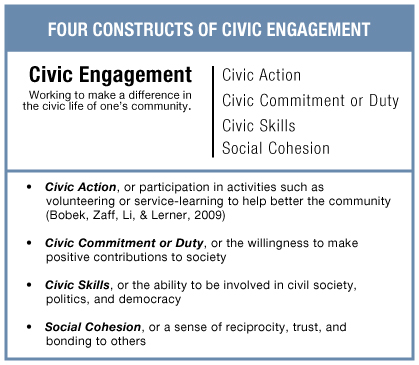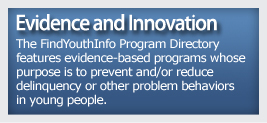Relationship to Volunteering and Service-Learning
Youth civic engagement is defined as working to make a difference in the civic life of one’s community. It also involves developing the combination of knowledge, skills, values, and motivation to make that difference (Erlich, 2000). These activities enrich the lives of youths and are socially beneficial to the community. Four interrelated constructs have been identified in the research literature as necessary for civic engagement:

Volunteering is only one form of civic engagement included, as defined above, in the construct of civic action and civic commitment or duty, but research has also shown a connection between youth who volunteer and other forms of youth civic engagement. Findings suggest that “among youth, volunteering plays a valuable role in shaping how youth learn to interact with their community and develop the skills, values, and sense of empowerment necessary to become active citizens” (Corporation for National and Community Service, 2005, p. 1).
While many youth volunteer, most young people do not see a connection between volunteering and political engagement or activism. In the 2006 National Civic and Political Health Survey, the majority of young people said that they volunteered in order to help others, not to address a social or political problem. Only six percent of youth believed that their volunteering was a means to address social or political problems (Lopez et al, 2006).
Another possible form of civic action and civic commitment and duty is service-learning. According to the American Psychological Association (2010), service-learning and civic engagement can be related but are not the same thing. Service-learning does not have to include a civic dimension and all forms of civic engagement are not service-learning. Civic engagement is a broader concept that may encompass, but is not limited to, service-learning. Service-learning differs from community service or volunteerism in two distinct ways:
- The service activity is integrated with academic curriculum and content.
- Students engage in reflection activities after their service experience and apply their learning in real-life activities (College of Southern Maryland, 2010).
Survey results from the Youth Volunteering and Civic Engagement Survey (Corporation for National Community Service, 2006) found that students who reported that they participated or were participating in service-learning were more likely to engage in activities that promote civic engagement. Compared to peers who didn’t participate in service-learning, service-learning participants were
- 71 percent more likely to report that they will volunteer in the upcoming year,
- 62 percent more likely to be interested in world events,
- more likely to talk about politics with friends and family, and
- more likely to believe they can make a difference in their community.
Learn more about service-learning.
American Psychological Association. (2010). Civic engagement. Retrieved from http://www.apa.org/education/undergrad/civic-engagement.aspx
Bobek, D. Zaff, J., Li, Y., & Lerner, R. M. (2009). Cognitive, emotional, and behavioral components of civic action: Towards an integrated measure of civic engagement. Journal of Applied Developmental Psychology, 30, 615-627.
College of Southern Maryland. (2010). Service-learning vs. volunteering. Retrieved from http://www.csmd.edu/servicelearning/orientation/vs.html
Corporation for National and Community Service. (2005). Building active citizens: The role of social institutions in teen volunteering. Brief 1 in the Youth Helping America series. Washington, DC. Retrieved from http://www.nationalservice.gov/pdf/05_1130_LSA_YHA_study.pdf (PDF, 24 Pages)
Corporation for National and Community Service. (2006). Educating for active citizenship: Service-learning, school-based service, and civic engagement. Brief 2 in the Youth Helping America Series. Washington, DC. Retrieved from http://www.nationalservice.gov/pdf/06_0323_SL_briefing.pdf (PDF, 43 Pages)
Erlich, T. (2000). Civic Responsibility and Higher Education. Westport, CT: Oryx Press.
Lopez, M.H., Levine, P., Both, D., Kiesa, A., Kirby, E., & Marcelo, K. (2006). The 2006 civic and political health of the nation: A detailed look at how youth participate in politics and communities. College Park, MD: Center for Information and Research on Civic Learning and Engagement (CIRCLE). Retrieved from http://www.civicyouth.org/PopUps/2006_CPHS_Report_update.pdf (PDF, 37 Pages)
Collaboration Profiles
Briefs
Youth Voices
Feature Articles
Tools & Guides
Programs
Technical Assistance
Websites
Publications


Announcements
Youth Topics

Map My Community is a tool designed specifically to assist you in locating resources in your community to help you build and strengthen your youth program. Get ideas for new partnerships, identify gaps in your community, and learn about resources to avoid duplication of effort.



















